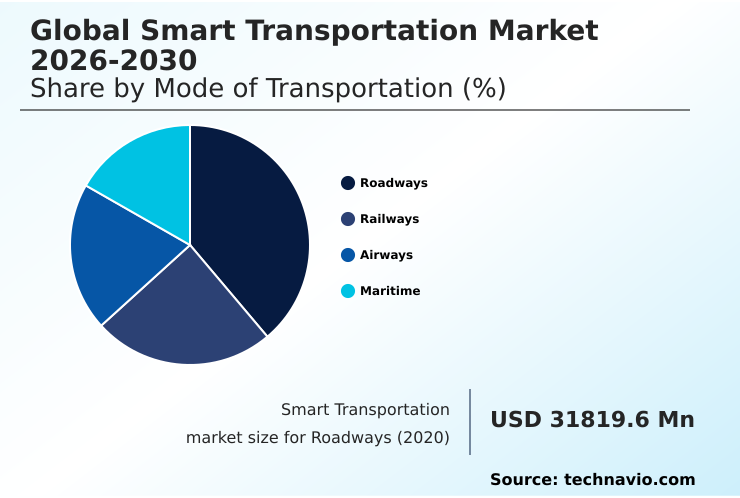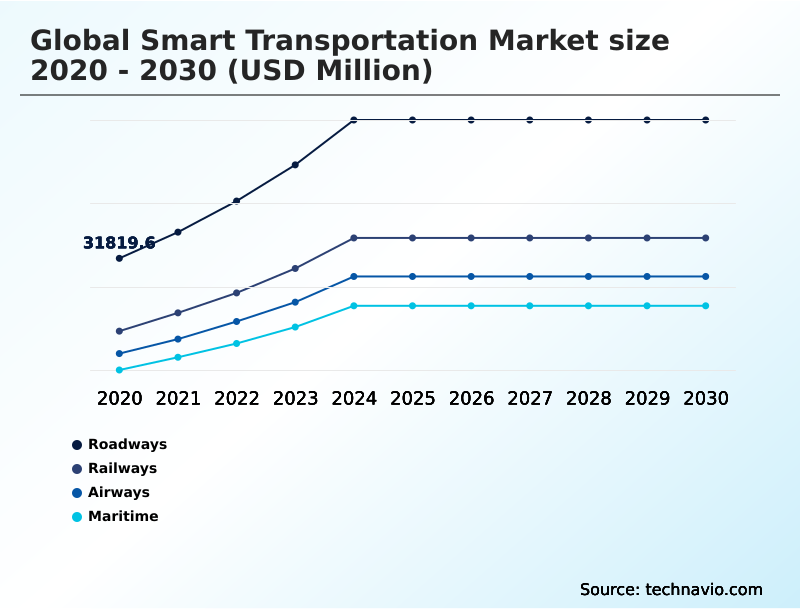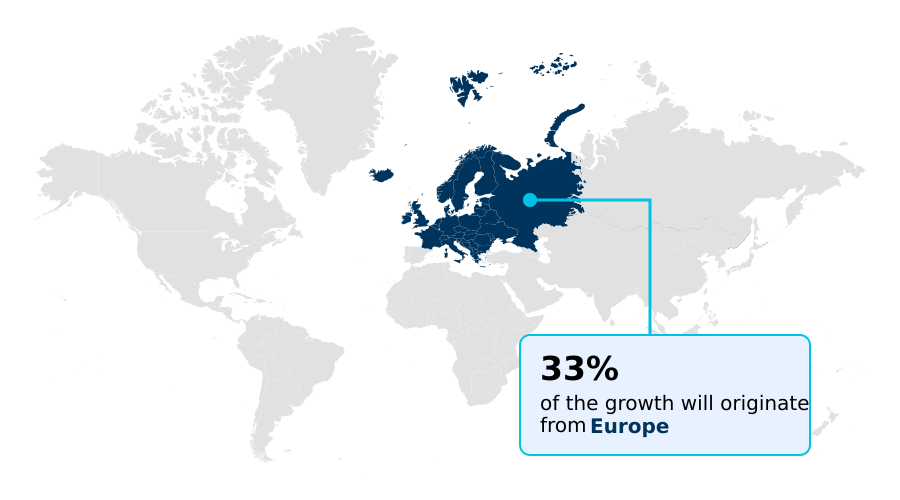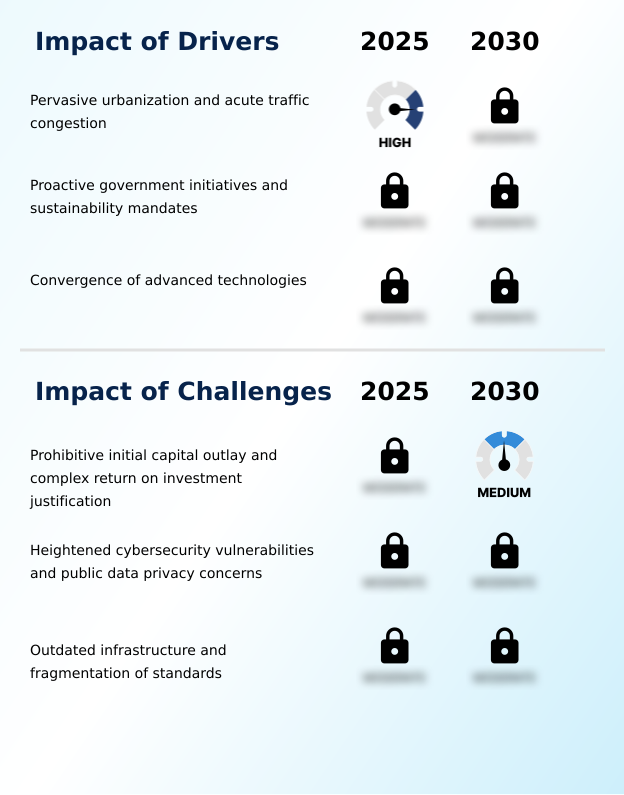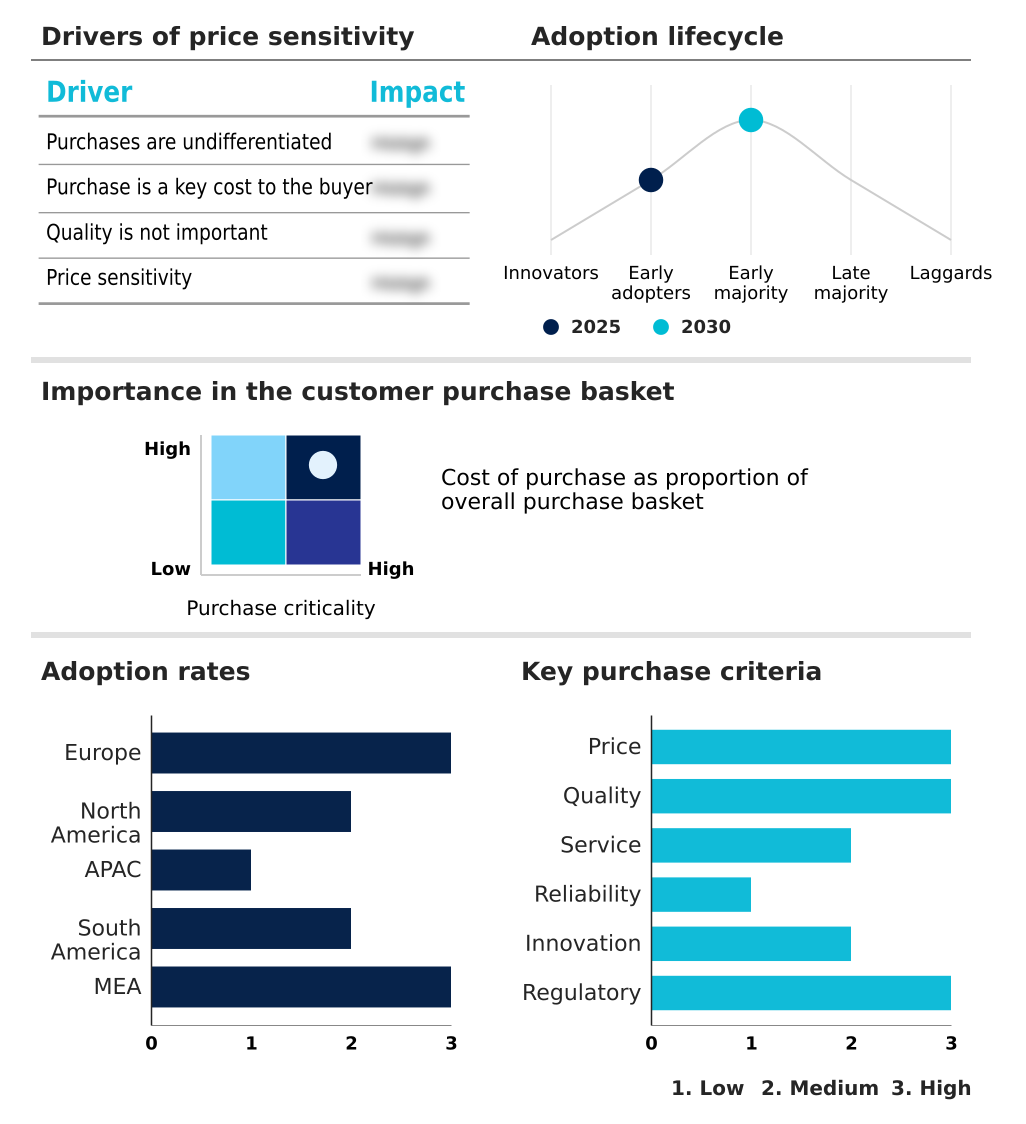Smart Transportation Market Size 2026-2030
The smart transportation market size is valued to increase by USD 300.79 billion, at a CAGR of 22.7% from 2025 to 2030. Pervasive urbanization and acute traffic congestion will drive the smart transportation market.
Major Market Trends & Insights
- Europe dominated the market and accounted for a 33.1% growth during the forecast period.
- By Mode of Transportation - Roadways segment was valued at USD 54.25 billion in 2024
- By Type - Solutions segment accounted for the largest market revenue share in 2024
Market Size & Forecast
- Market Opportunities: USD 387.49 billion
- Market Future Opportunities: USD 300.79 billion
- CAGR from 2025 to 2030 : 22.7%
Market Summary
- The smart transportation market is defined by an integrated ecosystem of technologies designed to create safer, more efficient, and sustainable mobility networks. This evolution is driven by the need to manage chronic urban congestion and reduce the environmental impact of transport.
- Core to this market is the use of IoT, AI, and high-speed communication to enable real-time data exchange between vehicles, infrastructure, and users. Key applications include intelligent traffic management, advanced public transit systems, and optimized freight logistics.
- For instance, a logistics company can leverage intermodal freight management solutions that use predictive traffic analytics to dynamically reroute shipments between trucks and trains, bypassing congestion and ensuring on-time delivery. This scenario highlights a shift from reactive problem-solving to proactive, data-driven optimization.
- The market's trajectory is toward creating fully connected and automated environments where connected vehicle technology and smart public transit converge to improve mobility for both individuals and commercial operations, fundamentally reshaping urban and long-haul transport.
What will be the Size of the Smart Transportation Market during the forecast period?
Get Key Insights on Market Forecast (PDF) Request Free Sample
How is the Smart Transportation Market Segmented?
The smart transportation industry research report provides comprehensive data (region-wise segment analysis), with forecasts and estimates in "USD million" for the period 2026-2030, as well as historical data from 2020-2024 for the following segments.
- Mode of transportation
- Roadways
- Railways
- Airways
- Maritime
- Type
- Solutions
- Services
- End-user
- Government
- Commercial ogranizations
- Geography
- Europe
- Germany
- UK
- France
- North America
- US
- Canada
- Mexico
- APAC
- China
- Japan
- South Korea
- South America
- Brazil
- Argentina
- Colombia
- Middle East and Africa
- Saudi Arabia
- UAE
- South Africa
- Rest of World (ROW)
- Europe
By Mode of Transportation Insights
The roadways segment is estimated to witness significant growth during the forecast period.
The roadways segment is undergoing a significant transformation, moving beyond simple infrastructure to become a dynamic, connected ecosystem.
The deployment of intelligent traffic management systems (itms) and cooperative intelligent transport systems (c-its) is central to this shift, enabling real-time communication and coordination.
Vehicle-to-everything (v2x) communication, supported by connected infrastructure, allows for the use of advanced driver-assistance systems (adas) and sophisticated collision avoidance systems.
These technologies facilitate automated incident detection and dynamic route optimization, with some systems reducing incident response times by up to 30%.
Furthermore, adaptive signal control and intelligent speed adaptation (isa) work in concert to smooth traffic flow, while smart parking solutions address urban congestion by minimizing search time for available spaces, promoting eco-driving support through reduced idling and circling.
The Roadways segment was valued at USD 54.25 billion in 2024 and showed a gradual increase during the forecast period.
Regional Analysis
Europe is estimated to contribute 33.1% to the growth of the global market during the forecast period.Technavio’s analysts have elaborately explained the regional trends and drivers that shape the market during the forecast period.
See How Smart Transportation Market Demand is Rising in Europe Request Free Sample
The geographic landscape of the market is characterized by distinct regional priorities and investment strategies.
Europe, which accounts for 33.1% of the market's incremental growth, is heavily influenced by policy-driven sustainability goals, leading to significant investment in smart grid integration for electric vehicles and advanced intermodal freight management.
North America, contributing 29.4%, focuses on technological innovation in connected vehicle technology and large-scale deployments of fleet management telematics.
Meanwhile, APAC is emerging as a critical growth hub, with rapid urbanization driving the adoption of mobility-as-a-service (maas) platforms that depend on sophisticated multimodal journey planning and integrated payment systems.
These platforms often incorporate digital twin simulation for urban planning and address challenges in last-mile delivery solutions, while also advancing technologies for vulnerable road user (vru) protection through enhanced traffic pattern recognition and urban mobility data analytics.
Market Dynamics
Our researchers analyzed the data with 2025 as the base year, along with the key drivers, trends, and challenges. A holistic analysis of drivers will help companies refine their marketing strategies to gain a competitive advantage.
- The strategic implementation of advanced systems is defining the next frontier of market innovation, focusing on holistic and predictive capabilities. The integration of v2x communication for vulnerable road user safety is becoming a critical urban planning metric, moving beyond vehicle-centric design.
- In parallel, ai-based predictive maintenance for rail networks is demonstrating a significant reduction in downtime compared to traditional methods, with some operators reporting a threefold decrease in service disruptions. The maas platform integration with public transit systems is creating more seamless urban mobility, while digital twin modeling for urban traffic simulation allows planners to test infrastructure changes virtually.
- Cybersecurity protocols for connected transportation infrastructure are now a primary concern, addressed through innovations like blockchain applications for secure smart ticketing and robust data privacy frameworks for mobility data platforms. The rollout of 5g network slicing for c-its applications and edge computing architecture for autonomous vehicles is enabling more complex, real-time functionalities.
- This includes adaptive traffic signal control using reinforcement learning and real-time analytics for intermodal freight optimization. Advanced perception technologies, such as lidar and camera fusion for adas perception, are enhancing safety, while iot sensor networks for smart parking availability are reducing urban congestion.
- Other key areas include smart grid solutions for electric bus fleet charging, intelligent speed adaptation for urban safety zones, and automated incident detection in highway tunnels, all contributing to a more efficient and safer ecosystem.
- The market is also looking toward the future with uam traffic management system integration, demand-responsive transit for low-density areas, and analyzing platooning technology impact on fuel efficiency through hd mapping updates for autonomous driving safety.
What are the key market drivers leading to the rise in the adoption of Smart Transportation Industry?
- Pervasive urbanization and the resulting acute traffic congestion serve as the key driver for the market's growth.
- Rapid urbanization is the primary driver compelling cities to adopt smarter transportation frameworks to manage unprecedented strain on infrastructure. The deployment of predictive traffic analytics, enabled by technologies like 5g for v2x communication, is crucial for proactive congestion management.
- This data-driven approach, supported by ai-powered traffic prediction and extensive drone-based traffic monitoring, allows for the optimization of existing networks.
- For instance, systems utilizing on-board units (obus) and roadside units (rsus) have been shown to reduce urban travel times by up to 20% in congested corridors.
- The push for sustainable transportation solutions is also accelerating the adoption of technologies ranging from smart port operations to advanced passenger information systems (pis) and smart ticketing.
- Innovations like lidar sensor fusion and edge computing for mobility are enhancing vehicle autonomy and safety, contributing to more efficient and greener urban environments.
What are the market trends shaping the Smart Transportation Industry?
- The ascendancy of Mobility-as-a-Service (MaaS) is a defining market trend. It represents a fundamental shift toward integrated, on-demand transportation ecosystems.
- A defining trend is the shift toward integrated mobility ecosystems, exemplified by the rise of Mobility-as-a-Service. These platforms are leveraging real-time transit information and advanced technologies such as autonomous train operation (ato) and communication-based train control (cbtc) to create seamless user journeys. The integration of electronic toll collection (etc) and demand-responsive transit further streamlines travel.
- This convergence is made possible by foundational technologies like cellular v2x (c-v2x) for robust connectivity and high-definition (hd) mapping for precision navigation. In some pilot programs, the adoption of such integrated platforms has increased public transit ridership by over 15%.
- Forward-looking concepts like vehicle-to-grid (v2g) technology are also gaining traction, alongside automated logistics and platooning technology, which can improve fuel efficiency in commercial fleets by more than 10% through coordinated driving.
What challenges does the Smart Transportation Industry face during its growth?
- The prohibitive initial capital outlay required for large-scale deployments, coupled with the complexity of justifying the return on investment, presents a key challenge to market growth.
- A significant challenge remains the high upfront capital investment and the complexity of integrating new digital systems with aging physical infrastructure. Deploying a comprehensive intelligent transportation network requires a coordinated strategy for smart corridor management and data-driven urban planning, which can be difficult to execute.
- Projects often face initial cost overruns of 10-20% due to unforeseen interoperability issues between systems for automated fare collection and traffic flow optimization. Moreover, ensuring robust cybersecurity for connected cars across a fragmented ecosystem is a persistent concern. Despite these hurdles, the long-term benefits are substantial; even a 5% improvement in traffic congestion management can yield significant economic returns.
- The successful orchestration of smart public transit, shared mobility services, electric vehicle fleet management, and digital freight matching is essential for realizing the full value proposition of these advanced systems.
Exclusive Technavio Analysis on Customer Landscape
The smart transportation market forecasting report includes the adoption lifecycle of the market, covering from the innovator’s stage to the laggard’s stage. It focuses on adoption rates in different regions based on penetration. Furthermore, the smart transportation market report also includes key purchase criteria and drivers of price sensitivity to help companies evaluate and develop their market growth analysis strategies.
Customer Landscape of Smart Transportation Industry
Competitive Landscape
Companies are implementing various strategies, such as strategic alliances, smart transportation market forecast, partnerships, mergers and acquisitions, geographical expansion, and product/service launches, to enhance their presence in the industry.
Accenture PLC - Offerings include digital transformation services leveraging AI and data analytics, designed to enhance mobility operations and optimize transportation infrastructure for increased efficiency.
The industry research and growth report includes detailed analyses of the competitive landscape of the market and information about key companies, including:
- Accenture PLC
- ALE International
- ALSTOM SA
- Cisco Systems Inc.
- Digi International Inc.
- General Electric Co.
- Hitachi Ltd.
- IBM Corp.
- Indra Sistemas SA
- Infinera Corp.
- Intel Corp.
- Kapsch TrafficCom AG
- NEC Corp.
- NExT S.R.L.
- Parsons Corp.
- Schneider Electric SE
- Siemens AG
- Thales Group
- WSP Global Inc.
Qualitative and quantitative analysis of companies has been conducted to help clients understand the wider business environment as well as the strengths and weaknesses of key industry players. Data is qualitatively analyzed to categorize companies as pure play, category-focused, industry-focused, and diversified; it is quantitatively analyzed to categorize companies as dominant, leading, strong, tentative, and weak.
Recent Development and News in Smart transportation market
- In September 2024, Intel Corp. launched its new AI-powered Metro AI Suite, a comprehensive platform designed for urban traffic management that leverages edge computing to provide real-time predictive traffic analytics and automated incident detection for city authorities.
- In November 2024, Siemens AG and the city of Hamburg announced a strategic partnership to develop and deploy an integrated Mobility-as-a-Service (MaaS) platform. The project aims to unify public transit, bike-sharing, and ride-hailing services into a single application to reduce private vehicle dependency.
- In January 2025, Hitachi Ltd. acquired a European startup specializing in digital twin simulation for transportation networks for approximately USD 250 million. This acquisition enhances Hitachi's capabilities in modeling and optimizing traffic flow for its smart city solutions.
- In April 2025, The US Department of Transportation issued new federal guidelines mandating the inclusion of Cellular V2X (C-V2X) communication capabilities in all new vehicles sold after 2028, aiming to standardize technology for vulnerable road user (VRU) protection.
Dive into Technavio’s robust research methodology, blending expert interviews, extensive data synthesis, and validated models for unparalleled Smart Transportation Market insights. See full methodology.
| Market Scope | |
|---|---|
| Page number | 295 |
| Base year | 2025 |
| Historic period | 2020-2024 |
| Forecast period | 2026-2030 |
| Growth momentum & CAGR | Accelerate at a CAGR of 22.7% |
| Market growth 2026-2030 | USD 300789.9 million |
| Market structure | Fragmented |
| YoY growth 2025-2026(%) | 19.6% |
| Key countries | Germany, UK, France, Italy, The Netherlands, Spain, US, Canada, Mexico, China, Japan, South Korea, India, Australia, Indonesia, Brazil, Argentina, Colombia, Saudi Arabia, UAE, South Africa, Egypt and Turkey |
| Competitive landscape | Leading Companies, Market Positioning of Companies, Competitive Strategies, and Industry Risks |
Research Analyst Overview
- The smart transportation market is evolving from siloed solutions toward a deeply interconnected ecosystem where data is the critical asset. This progression is driven by the integration of cooperative intelligent transport systems (c-its) that leverage vehicle-to-everything (v2x) communication and cellular v2x (c-v2x) to create a unified operational picture.
- For boardroom decisions, this means shifting investment focus from standalone hardware to scalable software platforms like mobility-as-a-service (maas) platforms, which integrate smart public transit and shared mobility services. Key technologies such as intelligent traffic management systems (itms) and predictive maintenance for infrastructure are becoming standard.
- In the rail sector, autonomous train operation (ato) and communication-based train control (cbtc) are enhancing capacity. The adoption of advanced driver-assistance systems (adas), powered by lidar sensor fusion and high-definition (hd) mapping, is foundational for future autonomy. Critically, integrated C-ITS platforms have demonstrated a 40% reduction in intersection-related collisions, a metric directly impacting safety compliance and liability.
- This ecosystem is supported by on-board units (obus), roadside units (rsus), and robust cybersecurity for connected cars, while addressing urban challenges through smart parking solutions, automated incident detection, adaptive signal control, and traffic congestion management. The integration of passenger information systems (pis) and smart ticketing with automated fare collection enhances the user experience.
- Furthermore, the market is expanding to include urban air mobility (uam), freight signal priority, and traffic flow optimization, all dependent on predictive traffic analytics, edge computing for mobility, and the smart grid integration required for vehicle-to-grid (v2g) technology and intermodal freight management.
What are the Key Data Covered in this Smart Transportation Market Research and Growth Report?
-
What is the expected growth of the Smart Transportation Market between 2026 and 2030?
-
USD 300.79 billion, at a CAGR of 22.7%
-
-
What segmentation does the market report cover?
-
The report is segmented by Mode of Transportation (Roadways, Railways, Airways, and Maritime), Type (Solutions, and Services), End-user (Government, and Commercial ogranizations) and Geography (Europe, North America, APAC, South America, Middle East and Africa)
-
-
Which regions are analyzed in the report?
-
Europe, North America, APAC, South America and Middle East and Africa
-
-
What are the key growth drivers and market challenges?
-
Pervasive urbanization and acute traffic congestion, Prohibitive initial capital outlay and complex return on investment justification
-
-
Who are the major players in the Smart Transportation Market?
-
Accenture PLC, ALE International, ALSTOM SA, Cisco Systems Inc., Digi International Inc., General Electric Co., Hitachi Ltd., IBM Corp., Indra Sistemas SA, Infinera Corp., Intel Corp., Kapsch TrafficCom AG, NEC Corp., NExT S.R.L., Parsons Corp., Schneider Electric SE, Siemens AG, Thales Group and WSP Global Inc.
-
Market Research Insights
- The market's dynamics are increasingly shaped by the pursuit of measurable efficiency gains through integrated digital solutions. The implementation of demand-responsive transit and multimodal journey planning is redefining urban mobility, while technologies like platooning technology are demonstrating direct operational benefits, with studies showing a potential reduction in fuel consumption by up to 12% for following vehicles.
- In logistics, digital freight matching platforms and automated yard management systems are streamlining operations, improving asset utilization by over 15% in some deployments. These advancements, underpinned by a connected infrastructure and sophisticated urban mobility data analytics, allow for dynamic route optimization and more effective traffic pattern recognition, directly translating technological capabilities into tangible economic and environmental advantages.
We can help! Our analysts can customize this smart transportation market research report to meet your requirements.


